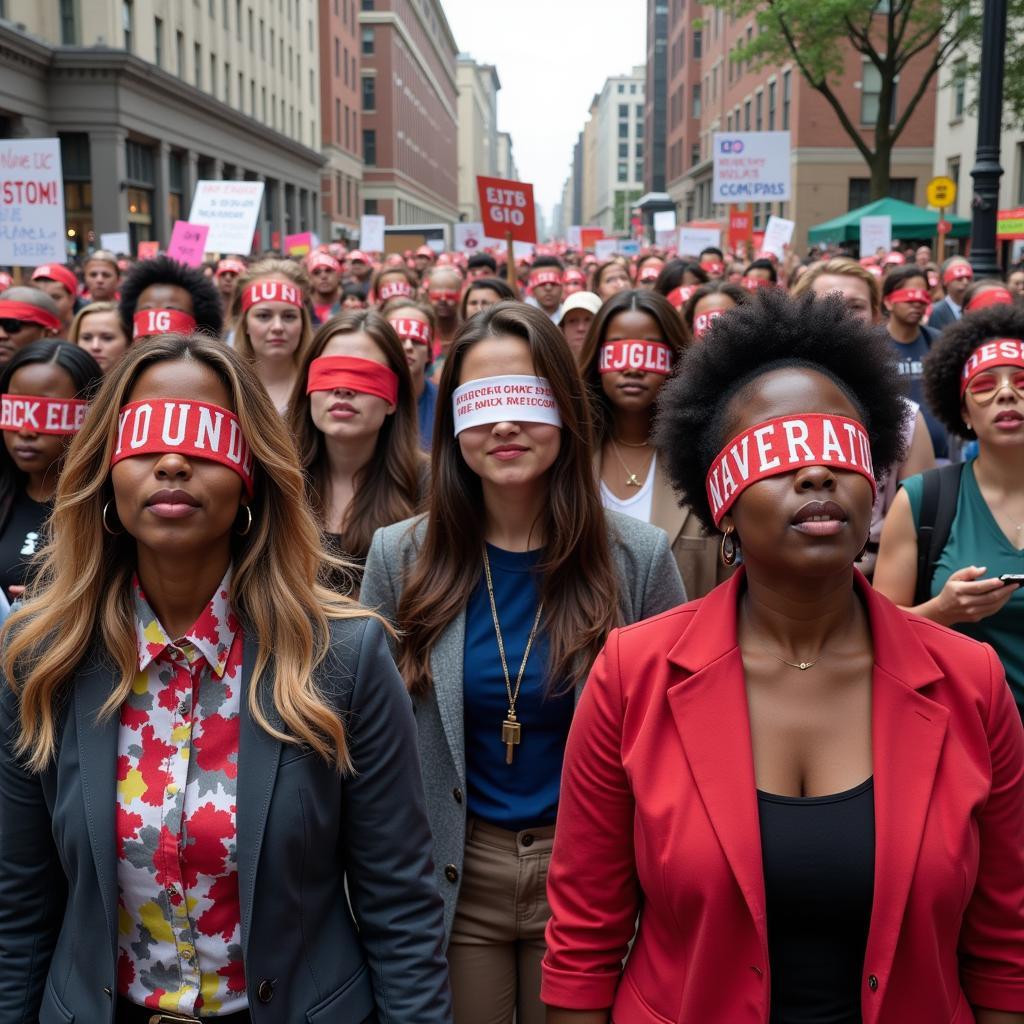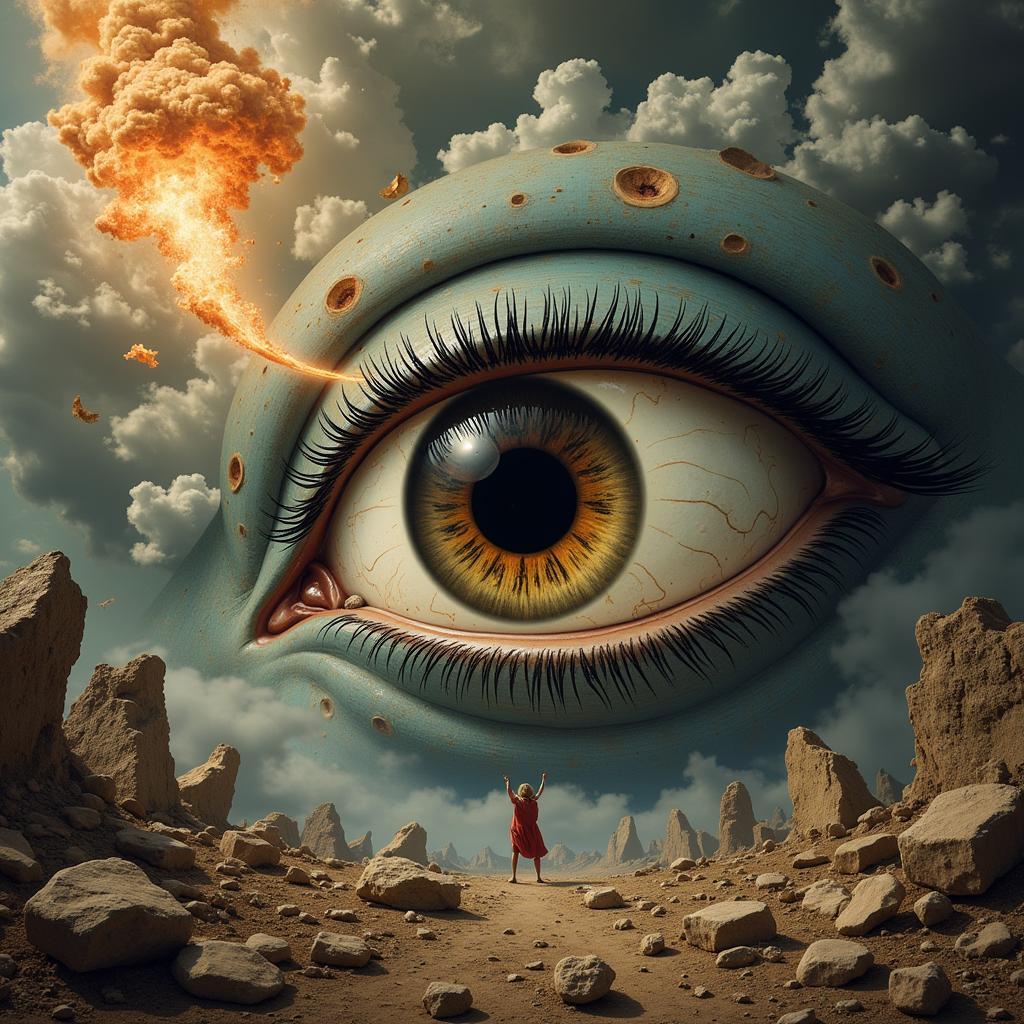The term “Society Of Blind Eye” paints a chilling picture – a collective choosing ignorance over awareness, allowing injustices and suffering to persist unnoticed and unchallenged. This isn’t about a physical lack of sight but a metaphorical blindness to the realities around us, often fueled by apathy, fear, or self-preservation. But what are the consequences of such willful blindness, and how can we, as individuals and a collective, strive for a world where awareness prevails?
 People protesting with blindfolds on, symbolizing turning a blind eye
People protesting with blindfolds on, symbolizing turning a blind eye
The Anatomy of Apathy: Understanding the “Blind Eye” Phenomenon
Turning a blind eye isn’t always a conscious decision. It often stems from complex psychological and social mechanisms:
- Cognitive Dissonance: When faced with information contradicting our beliefs or values, we often choose to ignore it to avoid discomfort or internal conflict. This dissonance allows us to maintain a sense of order and consistency in our worldview, even at the expense of truth.
- Diffusion of Responsibility: In group settings, the responsibility to act often feels dispersed. We convince ourselves that someone else will intervene, absolving ourselves from taking action. This bystander effect can be particularly potent in situations where speaking out carries perceived risks.
- Social Conformity: The pressure to conform to group norms and avoid social isolation is strong. When a group collectively turns a blind eye, individuals are less likely to challenge the status quo, fearing rejection or ostracism.
The High Cost of Inaction: Consequences of a “Blind Eye” Society
The consequences of a society that chooses blindness over awareness are far-reaching and devastating:
- Perpetuation of Injustice: When we ignore suffering, discrimination, or exploitation, we become complicit in their continuation. Silence empowers perpetrators and leaves victims feeling unheard, unseen, and disempowered.
- Erosion of Trust: A society where individuals feel obligated to ignore wrongdoings breeds suspicion and distrust. It undermines the social fabric, making genuine connection and collaboration increasingly difficult.
- Missed Opportunities for Growth: Confronting uncomfortable truths, though challenging, is crucial for personal and societal growth. By choosing blindness, we rob ourselves of opportunities to learn, evolve, and create a more just and compassionate world.
Cultivating Awareness: Breaking Free from the “Blind Eye” Mentality
The path to a more aware and just society begins with individual responsibility and action:
- Challenge Your Biases: We all hold unconscious biases that can cloud our judgment. Actively seek out diverse perspectives, challenge your assumptions, and be open to having your worldview challenged.
- Embrace Empathy: Put yourself in the shoes of others. Listen to their stories, understand their experiences, and allow yourself to be moved by their struggles. Empathy is the bridge that connects us to the human experience beyond our own limited perspectives.
- Speak Out Against Injustice: Silence is often interpreted as agreement. Use your voice to challenge harmful narratives, amplify marginalized voices, and advocate for those who are silenced.
- Support Organizations & Initiatives: Numerous organizations and individuals are working tirelessly to combat injustice and promote awareness. Support their efforts through volunteering, donations, or simply spreading the word about their work.
 A single hand reaches out and removes a blindfold, symbolizing the individual choice to become aware and take action.
A single hand reaches out and removes a blindfold, symbolizing the individual choice to become aware and take action.
Conclusion: Choosing to See
Building a society free from the shackles of willful blindness requires continuous effort, courage, and a willingness to confront uncomfortable truths. It’s a journey of individual awakening and collective responsibility. By choosing awareness over apathy, empathy over indifference, and action over inaction, we can create a world where everyone feels seen, heard, and valued. Let us choose to see, to understand, and to build a future where the “blind eye” is a relic of the past, not a defining characteristic of our present.
FAQ
1. What does “turning a blind eye” mean?
Turning a blind eye means choosing to ignore something wrong or unpleasant, even if you know it is happening.
2. Why do people turn a blind eye to injustice?
People might turn a blind eye due to fear, apathy, self-preservation, or a desire to maintain social harmony.
3. How can I be more aware of injustices happening around me?
Challenge your biases, seek out diverse perspectives, stay informed about current events, and engage in meaningful conversations about social issues.
4. What can I do to make a difference?
Speak out against injustice, support organizations fighting for change, educate yourself and others, and practice empathy in your daily life.
5. What are some examples of “blind eye” situations in history?
Examples include the Holocaust, the Rwandan genocide, and the ongoing refugee crisis, where widespread inaction and indifference contributed to immense suffering.
Need Help?
If you or someone you know needs help, please reach out. Contact our 24/7 hotline: 02043854663, email us at [email protected], or visit our office at Khu 34, Bắc Giang, 260000, Vietnam.
Explore More
Learn more about the effects of movies on society and other related topics on our website. Your journey towards a more peaceful and just world starts here.